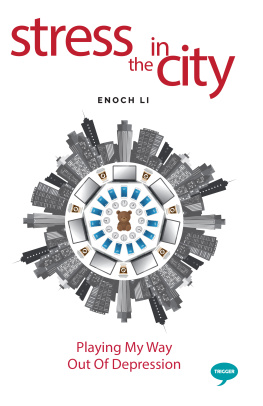Oh, you cant help that, said the Cat: Were all mad here. Im mad. Youre mad.
Chapter 1
IMPOSTOR
When I was in Tokyo, I was the invincible superwoman who had it all. Yet unbeknown to me, the corrosion had already started.
No woman wants to be considered weak or pathetic, or to risk the career they have been slaving away towards for years. Often, we maintain the image of strength. There are many people of my generation who, like me, are ambitious and addicted to the perks that go along with high-flying corporate jobs. We have no time to pause and evaluate our health or our happiness after all, who wouldnt be happy traveling the world, making an impressive salary, and accumulating accolades and praise for a job well done?
This stands doubly true for female executives hammering through the glass ceiling. We jet-set in our stiletto heels, attending business meetings across time zones and relishing the view from our hotels, offices and airports. We are far less likely to admit to depression even if we allowed ourselves to suspect we might be stressed or burnt out. How could we be expected to share our inner turmoil, when to be seen as anything less than capable and adaptable could mean the end of our bright career trajectories, and our paths to conventional happiness? We should be happy and cheerful all the time, even when were not.
Like every strong woman, my main priority at work was to out-perform and over-deliver. My second priority was to be cool, calm, and collected. I was to never let anyone guess I was angry or annoyed. I was to be patient with everyone. Polite but firm. Assertive but not bitchy. Outspoken but not loud. Sociable but not promiscuous. This was the image I wanted to promote, for I knew the corporate world was not kind to women, and the banking arena belonged to men. I had to win people over by not succumbing to the stereotypes of a weak, diffident or overly autocratic female manager.
Every morning, I took the Ginza line from Omotesand Station to the office. The 25-minute train ride was spent scrolling through my Blackberry to filter out the emails that needed attention in the office. I would type a quick reply to a few easy ones as the train jolted between stations. News was slotted into a specific folder to go through over a cup of coffee towards mid-morning. By the end of the journey, I would have in my head a visual plan of the amount and priority of work that awaited me. On the off-chance that I had a few minutes left, I would pretend to be disinterested and stare into space ahead of me, while actually taking the opportunity to survey the sleeping Japanese salarymen sardined between one another. I often wondered if any of them actually relished their lives.
In preparation for my move to Tokyo, I had read up on business etiquette and culture to ease my immersion into the land of the rising sun. As a result, I was nervous and jittery. A banking world overflowing with testosterone coupled with a culture that preferred men and seniority in age meant double scoops of challenge for me. Being female and at least half the age of every other executive was not something I could change. I had to convince them with my abilities and results. To me, success did not just mean I was effective as a manager or efficient in my work; it also meant I had to be well-liked. Reputation was key. A mentor once cautioned me that it took years to establish a reputation, but only seconds to destroy it. I chanted this like a religious mantra and kept my opinions to myself, maintaining the serene image I had crafted.
Frustration and anger would boil up inside me when colleagues from other departments were not helpful or did not pay me due deference. The traders would ignore my calls and the sales team would never have time to meet my clients. I swallowed it all and flushed it down the toilet bowl during my mini-escapades to placate myself. It was not until I referred a massive deal to one of them that anyone started to take notice of my name or answer one out of the five phone calls I made to them.
The parade of men eyed me with suspicion. To them, I must have been a child in oversized skirts and heels trying to look like an adult. I felt belittled, but I was patient and kept my cool during meetings. A few times, when my sensible voice was ignored, I excused myself to go to the ladies so I could cry, vent my frustrations, sit for a few minutes to let the red in my eyes fade and then go back into the meeting room as if nothing had happened. Then I would repeat myself with more conviction until one of the gentlemen agreed with me and vouched for my opinion. Passive aggression was easier to weather than the outright harassment faced by some of the other female executives, so I did not protest. Over time, I gained their trust and respect by proving my worth with my performance. And it wore me out.
The only immediate outlet I had during work hours was Japanese class. I wanted to practise the Japanese I had learnt and, in half-broken Japanese and half-English, I would recount the week with my teacher. I seemed to click well with my language teachers, perhaps because I was not competing with them in any way. My Japanese instructor became a sounding board to whom I could vent. I would disclose my innermost thoughts: what my managers were like, what the team was like, and what crap I was dealing with. I would tell her who I liked and who I did not like. We became good friends and I trusted her discretion. Unfortunately, I eventually had to cancel my classes as work took up more and more of my time, and I couldnt afford to be away from my desk if I wanted to leave the office at decent hours especially with the onset of the financial crisis in 2007 and throughout 2008.
The setback was systemic. Companies across industries had to cut costs and lay off employees to keep the businesses afloat. I worked doubly hard and managed to make money to meet my targets. My bosses were supportive and gave me responsibilities to stretch me. People saw perseverance in my pale complexion. Once, my assistant whispered in my ear, Maybe you should put on some make-up before heading to see the client; you look tired. I waved her off but relented after seeing my reflection in the mirror and dabbed some blusher on my cheeks. While everyone was holding onto their jobs like lifelines, I thrived for another year and came out with top ratings. My boss told me to take time off to rest, but I denied my fatigue, even after seeing my results from a compulsory online psychological wellbeing test they gave me.












